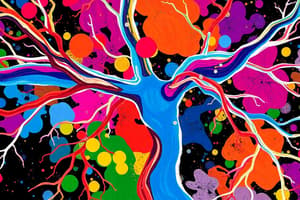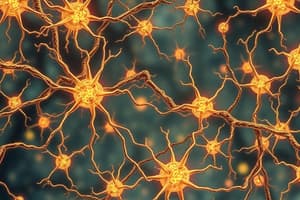Podcast
Questions and Answers
What is the function of the nervous system in complex animals?
What is the function of the nervous system in complex animals?
- Aids in digestion
- Regulates body temperature
- Provides structural support to the body
- Allows them to carry out all necessary functions (correct)
What is the evolutionary trend in the nervous system organization of vertebrates?
What is the evolutionary trend in the nervous system organization of vertebrates?
- Exhibits random variations from primitive sponges to vertebrates
- Demonstrates reduction in complexity from primitive sponges to vertebrates
- Remains unchanged from primitive sponges to vertebrates
- Shows increasing complexity from primitive sponges to vertebrates (correct)
What is the nervous system organization in simple multicellular animals like sponges?
What is the nervous system organization in simple multicellular animals like sponges?
- Do not have cells capable of responding to the environment
- Have a highly specialized nervous system for communication
- Have a centralized nervous system similar to vertebrates
- Lack nervous systems but their cells can respond to their environment and communicate with one another (correct)
What is the response of primitive sponges to stimuli?
What is the response of primitive sponges to stimuli?
What is the role of the nervous system in maintaining homeostasis?
What is the role of the nervous system in maintaining homeostasis?
Flashcards are hidden until you start studying
Study Notes
Nervous System Function
- The primary function of the nervous system in complex animals is to facilitate the integration and coordination of various physiological and behavioral processes, enabling the organism to respond to stimuli, adapt to its environment, and maintain homeostasis.
Evolutionary Trend in Vertebrates
- The evolutionary trend in the nervous system organization of vertebrates is a gradual increase in complexity, with more advanced species exhibiting more intricate neural structures and enhanced cognitive abilities.
Nervous System Organization in Simple Multicellular Animals
- In simple multicellular animals like sponges, the nervous system is rudimentary and consists of a network of nerve cells (neurons) that are dispersed throughout the body, without a centralized brain or sensory organs.
- This primitive nervous system is capable of responding to basic stimuli, such as touch, light, and chemicals.
Response of Primitive Sponges to Stimuli
- Primitive sponges respond to stimuli through a series of coordinated contractions and relaxations of their cells, which enable them to adjust to changes in their environment.
- This response is often slow and localized, and does not involve the transmission of signals over long distances.
Role of the Nervous System in Maintaining Homeostasis
- The nervous system plays a crucial role in maintaining homeostasis by regulating various physiological processes, such as heart rate, blood pressure, body temperature, and digestion, to ensure a stable internal environment.
- It achieves this through the integration of sensory information, processing of neural signals, and transmission of responses to effector organs, allowing the organism to adapt to changing conditions and maintain optimal functioning.
Studying That Suits You
Use AI to generate personalized quizzes and flashcards to suit your learning preferences.



